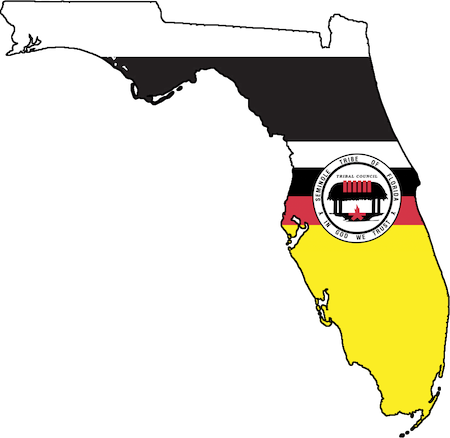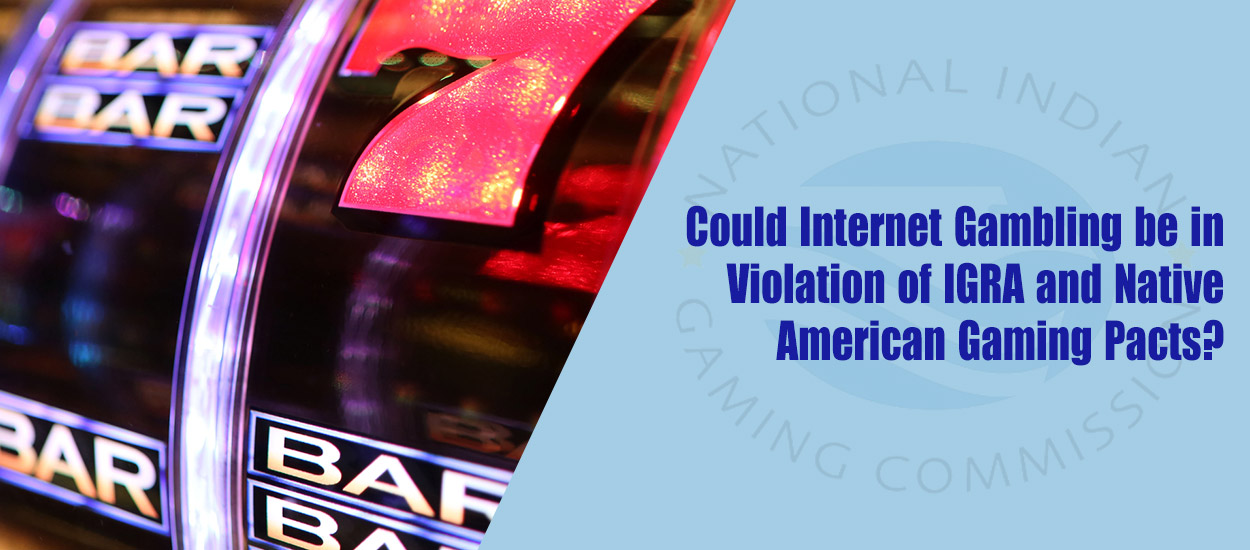A recent court ruling may be in violation of the Indian Gaming Regulation Act
Ron DeSantis and the state of Florida are said to have won a major victory last week after a federal appeals court refused to issue a rehearing for a decision it made in June that allows the Florida gambling compact regarding sports betting with the Seminole Tribe to move forward. The court did not give reason for that decision and the lack of any comments or explanation raises many concerns.  In 2021 Governor Ron DeSantis signed an agreement with the Seminole Tribe to give it exclusive rights to offer sports betting in the state along with expanded gambling on the reserves. The deal included a hub and spoke sports betting arrangement which allowed sports bettors to place wagers online from anywhere in the state via the internet or a sports betting app with the bets being processed through servers on Tribal land. The deal also allowed the Seminoles to team with pari-mutuel operators so that in-person sports bets could be placed at the pari-mutuel facilities not located on Tribal land. The compact was for 30 years and guaranteed the state at least $2.5 billion per year for the first five years.
In 2021 Governor Ron DeSantis signed an agreement with the Seminole Tribe to give it exclusive rights to offer sports betting in the state along with expanded gambling on the reserves. The deal included a hub and spoke sports betting arrangement which allowed sports bettors to place wagers online from anywhere in the state via the internet or a sports betting app with the bets being processed through servers on Tribal land. The deal also allowed the Seminoles to team with pari-mutuel operators so that in-person sports bets could be placed at the pari-mutuel facilities not located on Tribal land. The compact was for 30 years and guaranteed the state at least $2.5 billion per year for the first five years.
The compact was challenged by Bonita Springs Poker Room and Magic City Casino, who said that the compact violated the Indian Gaming Regulation Act (IGRA), which requires all betting to take place exclusively on Tribal land for a compact to be valid. A D.C. circuit court in 2021 agreed with the challenge and said that the compact was in violation of the IGRA and sports betting had to be halted, which the Tribes abruptly did. The Tribes appealed that ruling, but also took down an app for sports betting which had already signed-up customers and handled a few bets. That appeal was heard in June of 2023 and the D.C. District Court of Appeals unanimously overturned the circuit court’s ruling saying that the IGRA allowed a compact to include gambling on and off reserves without giving any real reasoning for their decision. The two plaintiffs, which are believed to have been partly funded by major online gambling sites, asked for a rehearing of that decision and last week the Appeals court refused to rehear the case without giving a reason for their decision. It is agreed that the plaintiffs won’t allow the issue to wrest there, so it is widely expected that they will appeal the latest decision to the U.S. Supreme Court (SCOTUS).
When the compact was announced and Bonita Springs and Magic Casino appealed it, the U.S. Secretary of the Interior, Deb Haaland, asked the courts to side with the state and allow the compact to go ahead. This was a bit surprising since the compact was clearly contrary to the rules of the IGRA and Haaland was a Democrat trying to provide a victory for one of the most right-wing Governors in the U.S. But District Court judge Dabney Friedrich said that U.S. Secretary was wrong when she said the compact was legal, calling her arguments for why it did not violate the IGRA "a fiction." But Haaland, who herself is Native American and an enrolled member of the Laguna Pueblo tribe in New Mexico, said that the government would be appealing that ruling.
Almost every legal authority agrees that the IGRA requires all betting to take place on Tribal land and the only question is whether bets on the internet take place where they originate or where they are handled and processed. Ironically, this is the exact issue that came up over 20 years ago when the DOJ issued arrest orders against various individuals taking internet bets offshore, including Jay Cohen and Steve Budin, with the gambling operators and governments overseas saying the bet takes place where it is handled, while the U.S. government said it takes place where it originates. So, the U.S. government’s argument now that the bet takes place where it is processed completely contradicts that earlier claim. If the bet indeed takes place at the location where the gambling server is located then all wagers online by U.S. citizens to countries outside the United States are legal and subject to the laws of Antigua, Costa Rica, Kahnawake, Malta, etc. But if that isn’t the case, then as Judge Fredrich said, the U.S. is making up "fiction" to justify a rule that permits a bet in a situation they want a bet to be legal, but disallowing similar bets for situations they do not want it to be legal. It is hypocritical, but the DOJ has had no issues making up rules as they see fit when it comes to gambling. Make no mistake, if the U.S. wants to amend the law so that the IGRA allows betting on and off Tribal lands then that is perfectly fine. But, as the law stands now, the Appeals’ court ruling that the IGRA allows betting off of Tribal lands, as long as the server is on Tribal lands, is completely contrary to the rules of the IGRA passed under Ronald Reagan’s term in 1988.
How SCOTUS will rule is very much uncertain
It is pretty much a guarantee now that the ruling will be appealed to the U.S. Supreme Court and it is uncertain how SCOTUS will rule. The court is very partisan and votes along party lines, but it’s unclear if the GOP majority on the Supreme Court will want to give a win to Ron DeSantis - if doing so gives a win to the Biden administration, which are the ones that asked the courts to legalize this compact in the first place.  As for Democrats on the Supreme Court, all three dissenting votes in the 2017 decision that overturned PASPA were by Democrat justices, although Ruth Bader Ginsburg has since passed away and Steven Breyer has retired. Judge Sonya Sotomayor, the other dissenting vote, is still on SCOTUS. So clearly pro gambling decisions are less likely by Democrat justices. It should be noted that the majority of justices are federalists and feel that the states have the last decision as to what is legal or not, so most justices will probably say that it’s up to the states to interpret the IGRA as they like. Although it is also possible the SCOTUS majority may simply amend the law to indicate that internet wagering is legal under the IGRA, as long as the bets are processed on servers located on Indian lands. However, if they do so, one has to suspect that countries like Antigua will demand that the U.S. reconsider their position to allow wagering taking place on their servers for bettors in the U.S. Most likely, the DOJ would say that’s different, since the servers (and bets) are located outside of the United States.
As for Democrats on the Supreme Court, all three dissenting votes in the 2017 decision that overturned PASPA were by Democrat justices, although Ruth Bader Ginsburg has since passed away and Steven Breyer has retired. Judge Sonya Sotomayor, the other dissenting vote, is still on SCOTUS. So clearly pro gambling decisions are less likely by Democrat justices. It should be noted that the majority of justices are federalists and feel that the states have the last decision as to what is legal or not, so most justices will probably say that it’s up to the states to interpret the IGRA as they like. Although it is also possible the SCOTUS majority may simply amend the law to indicate that internet wagering is legal under the IGRA, as long as the bets are processed on servers located on Indian lands. However, if they do so, one has to suspect that countries like Antigua will demand that the U.S. reconsider their position to allow wagering taking place on their servers for bettors in the U.S. Most likely, the DOJ would say that’s different, since the servers (and bets) are located outside of the United States.
It's also important that SCOTUS rule on the IGRA because other states that have bills ready to legalize sports betting are clearly waiting on a clarification on the limits of the IGRA before deciding how to proceed with Tribal compacts in their states. In California, the government and NIGC still cite the 2015 ruling of the courts in the California vs. Lipay Nation of Santa Ysabel case, where the courts said that the Tribe could not offer internet betting (in this case bingo), because the bets take place where the bettor is located and not where the server is. And in Michigan there is still a question as to whether the Tribal agreement they came up with there for tribes like the Bay Mills Indians was legal under the IGRA or not. States like Minnesota, Oklahoma and even Texas are waiting for a final federal ruling on the limits of the IGRA to determine if sports betting must take place on Tribal lands, since legal gambling in those states is Tribal only and the states all have bills on the table to at least consider licensing and regulating sports betting.
Wire Act up next?
If SCOTUS does agree to vote on the IGRA then the next gambling bill the highest court will likely be forced to rule on is the Wire Act. Almost every analyst, as well as many in the government, both Democrat and Republican, acknowledge that the Wire Act has been a noose on any real gambling expansion in the United States. The 1961 law was introduced by then Attorney General Robert F. Kennedy to give the police a law to arrest criminals who were using telephone lines to take bets on sports and horse racing to help fund other illegal activities. In 2002 a Federal Court opined that the Wire Act applied to all forms of communication, including the Internet, but only for sports betting. And this opinion was affirmed by the DOJ under the Barack Obama administration in 2011. That ruling was unsuccessfully changed in 2019 by the DOJ under Donald Trump, who, as a favor to Sheldon Adelson, tried to get the 2011 opinion reversed. But thus far there has been no official ruling on whether the Wire Act applies to all forms of communication, nor has it been decided whether it applies to casino wagering and poker. The lack of an official ruling on that by the federal courts has resulted in far fewer states offering casino wagering and poker than they would like. If SCOTUS ruled that the Wire Act only applied to sports betting, or better yet if SCOTUS threw out the Wire Act, like they did PASPA, then it is almost certain that casino and poker wagering would explode throughout the United States.
So, the unwillingness of the Appeals court to rehear their June decision seems like a victory for Ron DeSantis and the state of Florida, but until it is actually ruled on definitively by SCOTUS, the question as to whether internet gambling is in violation of the IGRA is still in question. If the courts do rule by the exact wording of the law, then the compact will be null and void. But if the courts choose to give an exception for the IGRA, or if they choose to amend it, then the compact will go forward. One thing is certain, however. Many states want a decision one way or the other, so hopefully SCOTUS will see this issue as an important one, just as they did with PASPA and will decide very quickly so states and the Tribes can get on with their planning without further delay.
Read insights from Hartley Henderson every week here at OSGA and check out Hartley's RUMOR MILL!







































